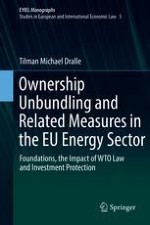2018 | OriginalPaper | Buchkapitel
5. International Economic Law as a Possible Limit to the Implementation of Unbundling and Unbundling-Related Measures: International Investment Law
verfasst von : Tilman Michael Dralle
Erschienen in: Ownership Unbundling and Related Measures in the EU Energy Sector
Aktivieren Sie unsere intelligente Suche, um passende Fachinhalte oder Patente zu finden.
Wählen Sie Textabschnitte aus um mit Künstlicher Intelligenz passenden Patente zu finden. powered by
Markieren Sie Textabschnitte, um KI-gestützt weitere passende Inhalte zu finden. powered by
